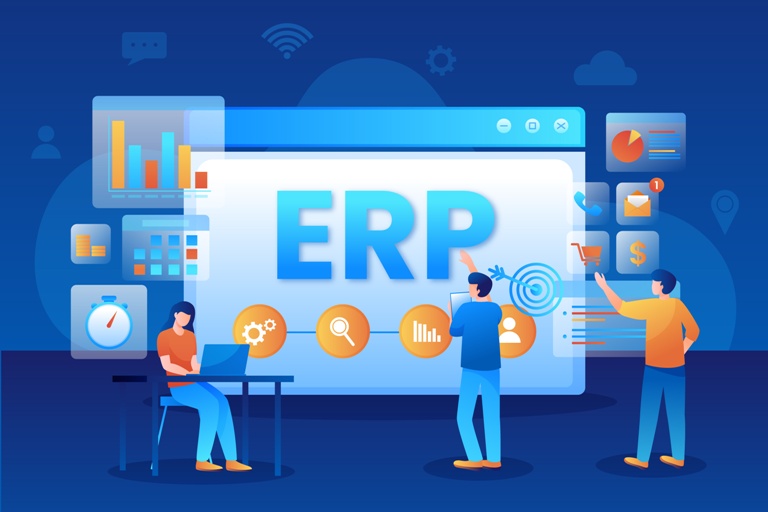Best ERP Development Company – A Comprehensive Guide to ERP Development
Accurate planning and real-time control of businesses is crucial for organizations to succeed in this era of digital transformation. Thus, a custom ERP is crucial for every business organization. To get that, you need the best ERP development company. In this blog, we will discuss the different steps of developing a custom ERP.
Developing a custom ERP is complicated, but it is worth it. It offers the ideal compatibility with the company’s processes. The core benefit of a custom ERP system is that it is developed specifically for the company’s needs. Therefore, the company will get software that perfectly suits the organization’s operations and caters to the strategies. When you get a custom ERP system developed by the best ERP development company, it will not have integrational issues. Rest assured that it will offer the best execution of the business functionality.
Here is a checklist of the custom ERP development process:
-
Understanding the Business Process and Defining the Goals
The starting of software doesn’t begin with codes but with understanding the business of the client. The meetings and negotiations between the client and the company offer complete clarity. Clients should explain their requirements and expectations about the functionality of the product that they want.
-
Blueprint and Prototype Creation
When you choose the best ERP development company, the team will pay close attention to the prototype. This is where one must decide on the modules that the system shall contain. The most common modules are manufacturing, sales, finance, HR, and customer relationship management. Other services and functions can be integrated into the system based on the client’s requirements.
-
Development
This is the stage where the technical decisions should be made. These include:
- Hosting (cloud or on-premises)
- Backend (databases, security systems, architecture, content management, and other components that make the software work, update, or change)
- Frontend (UI & UX)
- Integration (Important information should not be lost but reconfigured to be available for further usage in a new software structure)
-
Testing
The team has different types of testing. These include system, functional, unit, integration, security, and more. In the end, the engineers check if the software meets all the initial requirements and is comfortable to continue to work with. After this, the system is implemented and accepted by the client.
Which Industries Need the Support of the Best ERP Development Company?
If you look at the existing industries, the general working process is similar and connected with a supply chain, internal communication, customer relationships, accounting & finance control, marketing, and production. Consequently, any industry can be managed by a typical software solution with proper customization. There are integrated enterprise resource management applications available in the market for all sorts of industries. The most involved ones are:
- Healthcare
- Manufacturing
- Hospitality
- Retail & Wholesale
- Construction
- Transportation & Logistics
The Interior or a Custom ERP System
Enterprise resource management software has a modular architecture. This means that workers will only be able to access those modules of the system that concern their duties while the top management can review the data and make changes in the complete system. The best ERP development companies ensure a modular approach. Thus, business organizations can enhance security and get much more accurate data throughout all levels.
Functionality
In general, the ERP modules have the same functionality.
- Order processing
- Production management and manufacturing resource tracking
- Supply chain management
- Content management
- Customer relationship management
- Human resource management
- Financial management
- Partnership and deal management
- Marketing
- Analysis and reporting
Must-Have Features of ERP System
ERP applications are loaded with a wide array of tools and features based on the industry they will be used. Here are the must-have features of an efficient ERP system.
-
Housing Options
Based on the business specifics, different companies have different flexibility needs and security requirements. They must be free to choose where to store the data. The best ERP development company should offer all possible options. These include:
- On-Premises Servers
- Cloud Storage
- Hybrid Integration platforms
This is where companies can decide what works best for them without limitations regarding access, data protection, needed space, and maintenance price.
-
Easy to Integrate
Due to the modular structure of ERP platforms, they include various function-specific solutions like CMS and CRM systems, supply chain management, HR management, financial, marketing, manufacturing resource planning, and other modules. To avoid silos, platforms need proper integration of the stand-alone parts that will enable a holistic overview of all systems and a well-coordinated operation. It also enables an easy and quick migration or updating process.
-
Scalability
According to the best ERP development companies, the ERP system must be scalable to meet the growing requirements of the businesses, and it should be able to adapt to future needs. Otherwise, the companies might face problems within a couple of years, and they might need to start the process from the very beginning.








